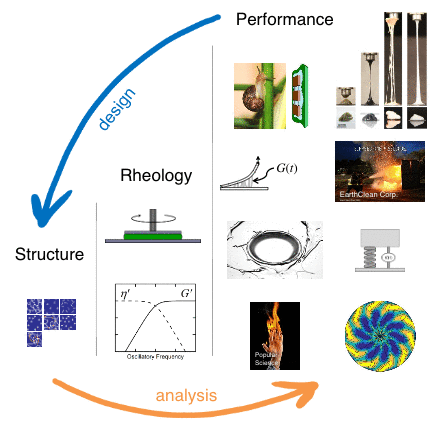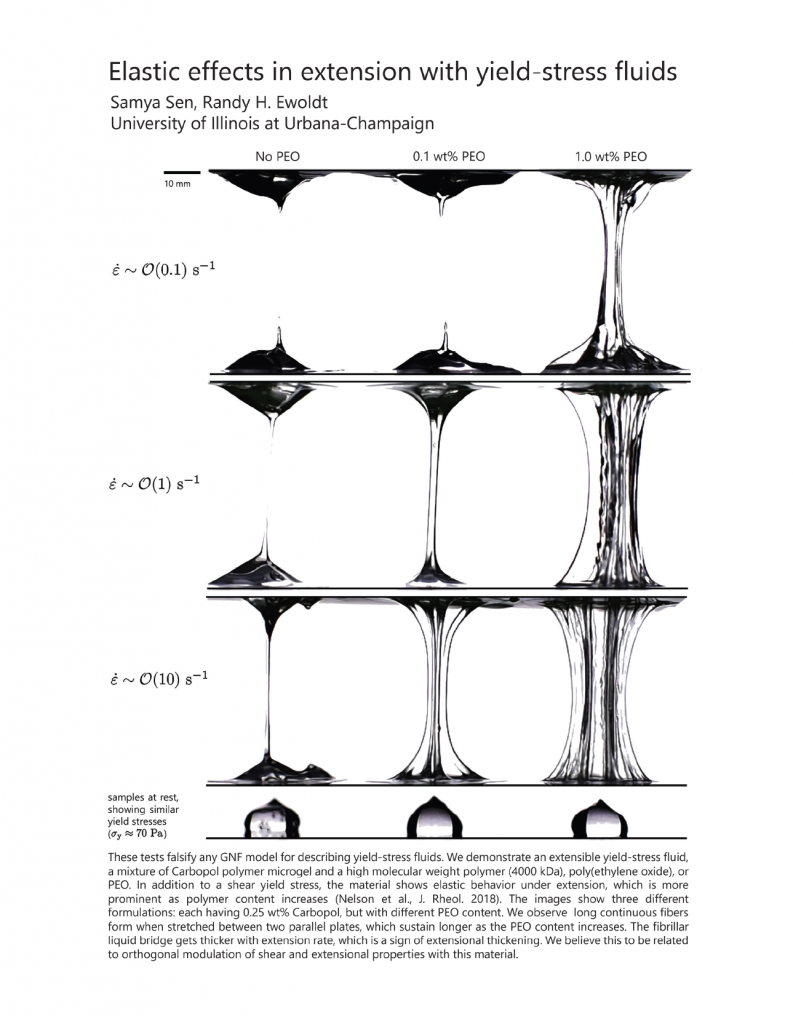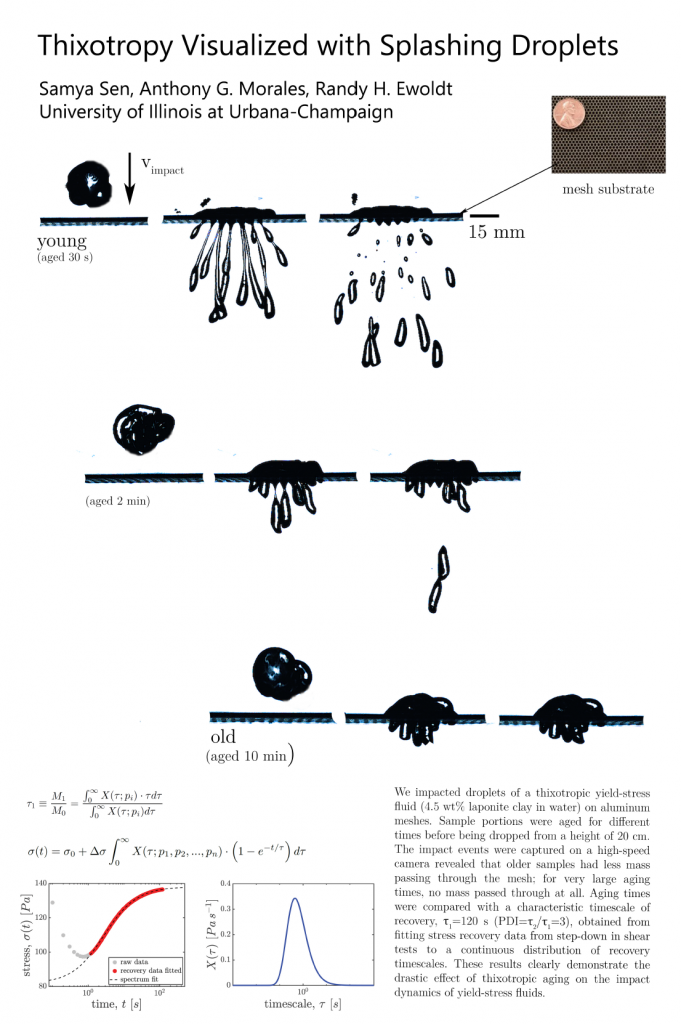(see also the individual People pages for more details of current activity)
Vision

Our long-term vision is that complex rheology, involving both fluid-like and solid-like behavior, will enable new engineering design opportunities.
Motivating applications include soft robotics, direct-write 3D printing, wildfire suppression, splashing and coating, energy storage flow batteries, adhesion, foods, hydraulic fluid systems, and vibration isolation, to name a few.
Within this scope, we identify fundamental research questions that involve physics, fluid mechanics, solid mechanics, measurement science, mathematical modeling, and materials science.
Approach
Fundamental research questions include the description and measurement of nonlinear viscoelastic properties, predictive mathematical models, and inverse problems to identify property requirements and relate these properties to underlying material structure (ranging in length scale from millimeters down to nanometers). Identifying these property targets is particularly challenging for rheological properties which are often high-dimensional functions, rather than constants.
Some of our projects create knowledge applicable to all materials (fluids, solids, and things in-between), transcending any specific material class (not limited to polymers, colloids, emulsions, etc.). We have a particular focus on weakly-nonlinear characterization known as medium-amplitude oscillatory shear (MAOS), errors and uncertainty in rheometry, and identifying rheological design targets independent of underlying chemistry formulation.
Other projects produce insight about particular materials, especially thixotropic yield stress fluids, polymer gels, and curious biological materials. This work requires consideration of underlying chemistry and microstructure, where we have made recent contributions to transient polymer networks of PVA-Borax, colloidal hard sphere suspensions, emulsions for direct-write 3D printing, and hagfish defense gel (a.k.a. hagfish slime).
Experimental Techniques
Rheometers and high-speed cameras have allowed several first-of-their-kind measurements in our lab. Breakthrough studies on yield-stress fluid impacts have been done with the aid of the high-speed camera, and current research continues to push boundaries of types of material studied, including thixotropic materials.
We are developing new rheometry methods and pushing experimental boundaries, allowing us to study peculiar biomaterials such as hagfish defense gel and ant venom foam.

Mathematical techniques
We develop new structure-rheology constitutive models, analytically solve for weakly-nonlinear perturbations of constitutive equations, use signal processing techniques such as Fourier transforms and uncertainty quantification, apply design optimization methods, and use Bayesian inference techniques for model selection.
This helps us answer question such as “What equations govern the behavior of these materials?” and “What underlying molecular structure is responsible?”

Gallery
Videos (from Ewoldt Research Group Youtube channel)
Ewoldt Group 2018 APS-DFD Gallery of Fluid Motion: Stick or Splash? Thixotropy Decides!
Samya Sen, Randy H. Ewoldt
Ewoldt group 2016 APS-DFD Gallery of Fluid Motion: Impacts on a screen
Brendan C. Blackwell, Mrunal J. Sarvaiya, Randy H. Ewoldt
Ewoldt group 2015 APS-DFD Gallery of Fluid Motion: Fire suppression with yield-stress fluids
Brendan C. Blackwell, Athrey E. Nadhan, Alex Wu, Randy H. Ewoldt
Ewoldt group 2015 APS-DFD Gallery of Fluid Motion: Strangely Stable Sphere Stacking
Piyush K. Singh, Jason Lee, Jonathan B. Freund, Randy H. Ewoldt
Ewoldt group 2014 APS-DFD Gallery of Fluid Motion: Yield stress fluids impacting heated surfaces
Brendan C. Blackwell, Athrey E. Nadhan, Alex Wu, Randy H. Ewoldt
Ewoldt group 2013 APS-DFD Gallery of Fluid Motion: Liquid-solid impacts of yield-stress fluids
Marc E. Deetjen, Brendan C. Blackwell, Joseph E. Gaudio, Randy H. Ewoldt
Posters
Samya Sen, Randy H. Ewoldt
Gallery of Rheology, Society of Rheology Annual Meeting, 2019
PDF
Samya Sen, Anthony G. Morales, Randy H. Ewoldt
Gallery of Rheology, Society of Rheology Annual Meeting, 2018
PDF
Conferences We Attend
Every year (or nearly):
- SOR: The Society of Rheology Annual Meeting
- APS-DFD: American Physical Society – Division of Fluid Dynamics
- ASME IDETC: ASME International Design Engineering Technical Conferences
Others:
- AERC: European Society of Rheology Annual Meeting
- NRC: Nordic Rheology Conference
- USNC/TAM: U.S. National Committee on Theoretical and Applied Mechanics
- IUTAM: International Congress of Theoretical and Applied Mechanics
- SICB: The Society for Integrative & Comparative Biology
- APS meetings: see Topical Group on Soft Matter and Division of Polymer Physics
- ASME Annual Meeting
- AIChE Annual Meeting
Acknowledgement of Support



